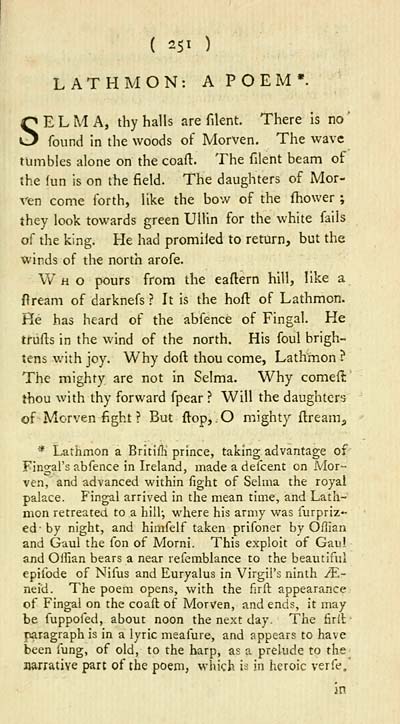Download files
Complete book:
Individual page:
Thumbnail gallery: Grid view | List view

( 251 )
LATH M ON: A POEM*.
SELMA, thy halls are filent. There is no'
found in the woods of Morven. The wave
tumbles alone on the coaft. The filent beam of
the (un is on the field. The daughters of Mor-
ven come forth, like the bow of the fhower ;
they look towards green UUin for the white fails
of the king. He had promiled to return, but the
winds of the north arofe.
W H o pours from the eaftern hill, like a
flream of darknefs ? It is the hoft of Lathmon.
He has heard of the abfence of Fingal. He
trufls in the wind of the north. His foul brigh-
tens with joy. Why doft thou come, Lathmon ?
The mighty are not in Selma. Why comeft
thou with thy forward fpear ? Will the daughters
of Morven fight ? But flop, .O mighty ftream^
* Lathmon a Britiffi prince, taking advantage of
Fingal's abfence in Ireland, made a defcent on Mor-
ven, and advanced within fight of Selma the royal
palace. Fingal arrived in the mean time, and Lath-
mon retreated to a hill-, where his army was furpriz*-
edby night, and himfelf taken prifoner by OiTian
and Gaul the fon of Morni. This exploit of Gaii)
and Oifian bears a near refcmblance to the beautiful
epifode of Nifus and Euryalus in Virgil's ninth lE.-
neid. The poem opens, with the firft appearance
of Fingal on the coaft of Morven, and ends, it may
be fuppofed, about noon the next day. The fir(l ■
paragraph is in a lyric meafure, and appears to have
been fung, of old, to the harp, as a prelude to the
narrative part of the poem, which is in heroic verfe.
LATH M ON: A POEM*.
SELMA, thy halls are filent. There is no'
found in the woods of Morven. The wave
tumbles alone on the coaft. The filent beam of
the (un is on the field. The daughters of Mor-
ven come forth, like the bow of the fhower ;
they look towards green UUin for the white fails
of the king. He had promiled to return, but the
winds of the north arofe.
W H o pours from the eaftern hill, like a
flream of darknefs ? It is the hoft of Lathmon.
He has heard of the abfence of Fingal. He
trufls in the wind of the north. His foul brigh-
tens with joy. Why doft thou come, Lathmon ?
The mighty are not in Selma. Why comeft
thou with thy forward fpear ? Will the daughters
of Morven fight ? But flop, .O mighty ftream^
* Lathmon a Britiffi prince, taking advantage of
Fingal's abfence in Ireland, made a defcent on Mor-
ven, and advanced within fight of Selma the royal
palace. Fingal arrived in the mean time, and Lath-
mon retreated to a hill-, where his army was furpriz*-
edby night, and himfelf taken prifoner by OiTian
and Gaul the fon of Morni. This exploit of Gaii)
and Oifian bears a near refcmblance to the beautiful
epifode of Nifus and Euryalus in Virgil's ninth lE.-
neid. The poem opens, with the firft appearance
of Fingal on the coaft of Morven, and ends, it may
be fuppofed, about noon the next day. The fir(l ■
paragraph is in a lyric meafure, and appears to have
been fung, of old, to the harp, as a prelude to the
narrative part of the poem, which is in heroic verfe.
Set display mode to: Large image | Transcription
Images and transcriptions on this page, including medium image downloads, may be used under the Creative Commons Attribution 4.0 International Licence unless otherwise stated. ![]()
| Early Gaelic Book Collections > Ossian Collection > Fingal, an ancient epic poem > (289) |
|---|
| Permanent URL | https://digital.nls.uk/77450444 |
|---|
| Description | Selected books from the Ossian Collection of 327 volumes, originally assembled by J. Norman Methven of Perth. Different editions and translations of James MacPherson's epic poem 'Ossian', some with a map of the 'Kingdom of Connor'. Also secondary material relating to Ossianic poetry and the Ossian controversy. |
|---|
| Description | Selected items from five 'Special and Named Printed Collections'. Includes books in Gaelic and other Celtic languages, works about the Gaels, their languages, literature, culture and history. |
|---|

